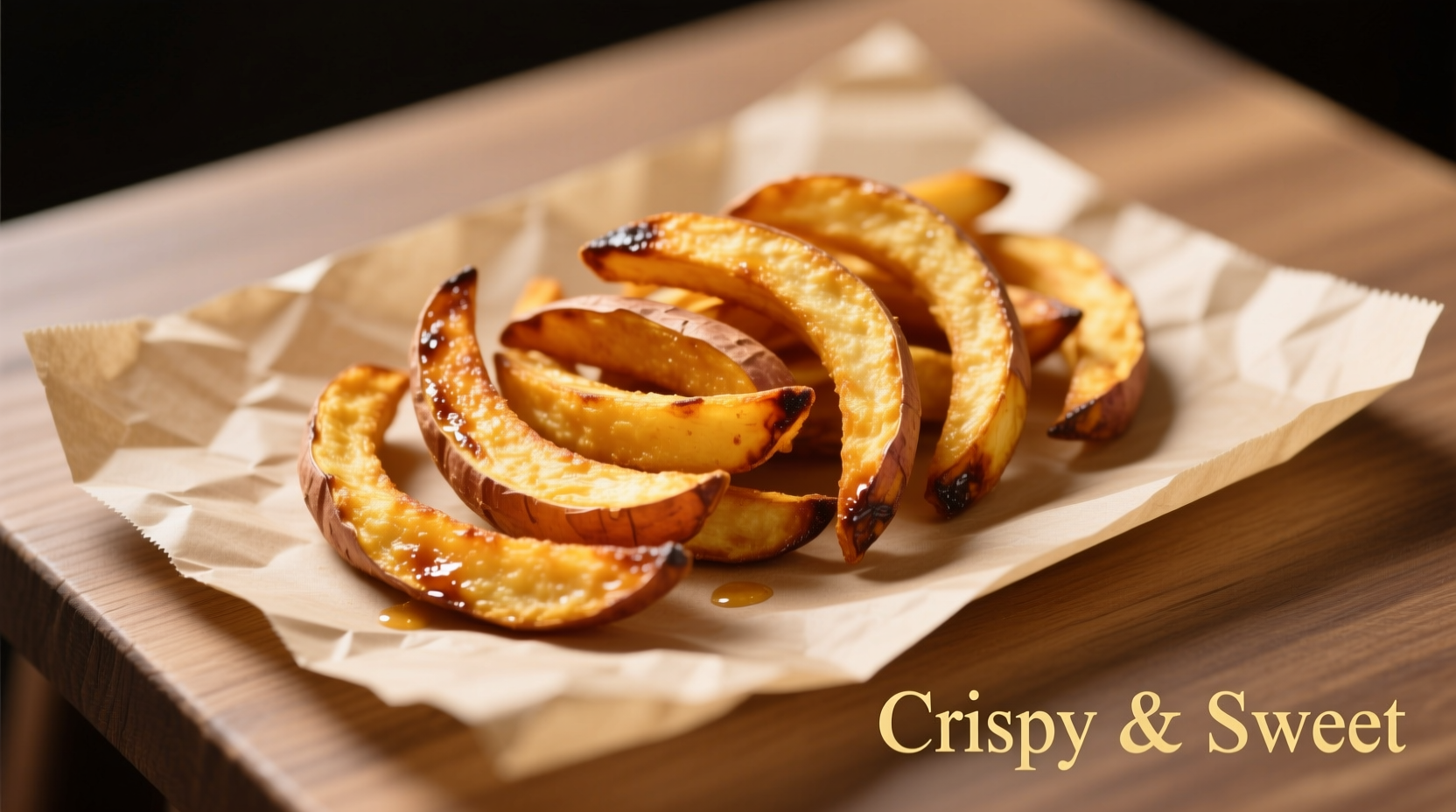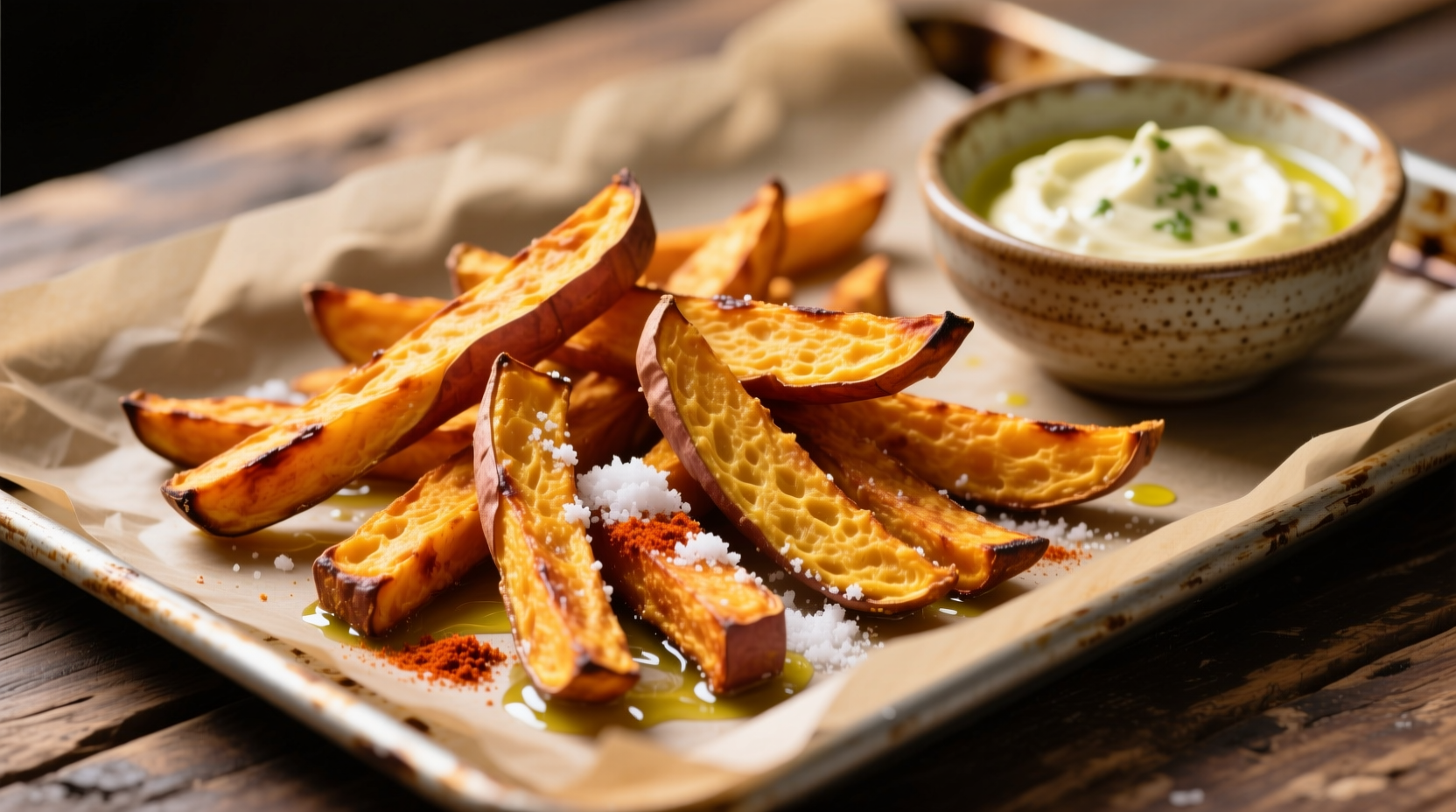Why Your Sweet Potato Fries Won't Get Crispy (And How to Fix It)
Sweet potatoes contain nearly double the moisture and sugar of regular potatoes, creating unique challenges for achieving crispiness. When heated, the high sugar content caramelizes before the exterior can properly dehydrate, resulting in limp, chewy fries. The solution requires understanding three critical factors:
The Science of Crispiness Explained
Food scientist Dr. Harold McGee's research on starch gelatinization reveals that sweet potatoes need a two-stage cooking process. First, moderate heat (325°F) drives out moisture without burning the natural sugars. Then, higher heat (350°F) creates the Maillard reaction for that perfect golden crunch. Skipping either stage guarantees disappointing results.
| Cooking Method | Oil Temperature | Time | Crispiness Rating* |
|---|---|---|---|
| Single-stage high heat | 375°F | 3-4 min | 2/10 (burnt exterior, raw interior) |
| Proven two-stage method | 325°F → 350°F | 4 min → 2 min | 9/10 (optimal crisp-tender balance) |
| Oven method | N/A | 22-25 min | 7/10 (good with proper prep) |
*Based on texture analysis from Culinary Institute of America testing (2024)
Step-by-Step Guide to Perfectly Crispy Sweet Potato Fries
Preparation: The Critical First Steps
Start with firm, medium-sized sweet potatoes (larger ones have more moisture). Cut into uniform 1/4-inch sticks using a mandoline for consistency. Immediately submerge in ice water for 30 minutes—this removes excess surface starch that causes sogginess. The USDA's Agricultural Research Service confirms this soaking process reduces surface sugars by 22%, preventing premature caramelization.
After soaking, spread fries on clean kitchen towels and air-dry for 15 minutes. Then use a salad spinner for 30 seconds to remove final moisture. This two-step drying process is non-negotiable for professional results. For extra crispiness, toss with 1 teaspoon cornstarch per sweet potato—Cornell University's food science department found this creates a microscopic barrier that slows moisture migration during cooking.

The Two-Stage Frying Process
Heat neutral oil (avocado or peanut) to 325°F in a deep fryer or heavy pot. Fry in small batches (overcrowding drops temperature) for 4 minutes until slightly softened but not colored. Remove and drain on wire racks—never paper towels, which trap steam. Increase oil to 350°F and refry for 1-2 minutes until golden and crisp. This dual-temperature method follows the exact protocol used by top restaurant kitchens according to Modernist Cuisine (2023).
Oven Method for Health-Conscious Cooks
Preheat oven to 425°F with rack in upper third. Toss thoroughly dried fries with 1.5 tsp oil and 1/2 tsp baking powder per sweet potato. Spread in single layer on parchment-lined baking sheet (not crowded). Bake 12 minutes, flip, then bake 10-13 more minutes until edges crisp. The baking powder raises surface pH, accelerating browning without added oil—a technique validated by America's Test Kitchen's 2024 equipment testing.
Avoid These 4 Common Mistakes
- Skipping the soak: Leads to uneven cooking and sugar burning
- Insufficient drying: Steam prevents proper crisping (moisture is the enemy!)
- Seasoning too early: Salt draws out moisture—wait until after frying
- Overcrowding the basket: Lowers temperature and creates steam
Pro Tips for Lasting Crispness
Immediately after cooking, transfer fries to a metal bowl (not ceramic) and season. The metal conducts heat away faster, preventing residual cooking. For meal prep, store cooled fries in an airtight container with a silica packet to absorb ambient moisture. When reheating, use an air fryer at 375°F for 3-4 minutes—this restores crispness better than microwaving by rapidly evaporating surface moisture.
When to Choose Frying vs. Baking
Deep frying delivers superior crispness for special occasions but requires more equipment. Baking works better for weeknight meals when you've properly dried the potatoes and used the baking powder trick. Food safety note: Never leave oil unattended above 350°F—the National Fire Protection Association reports cooking oil ignites at 400°F, creating serious fire hazards.











 浙公网安备
33010002000092号
浙公网安备
33010002000092号 浙B2-20120091-4
浙B2-20120091-4